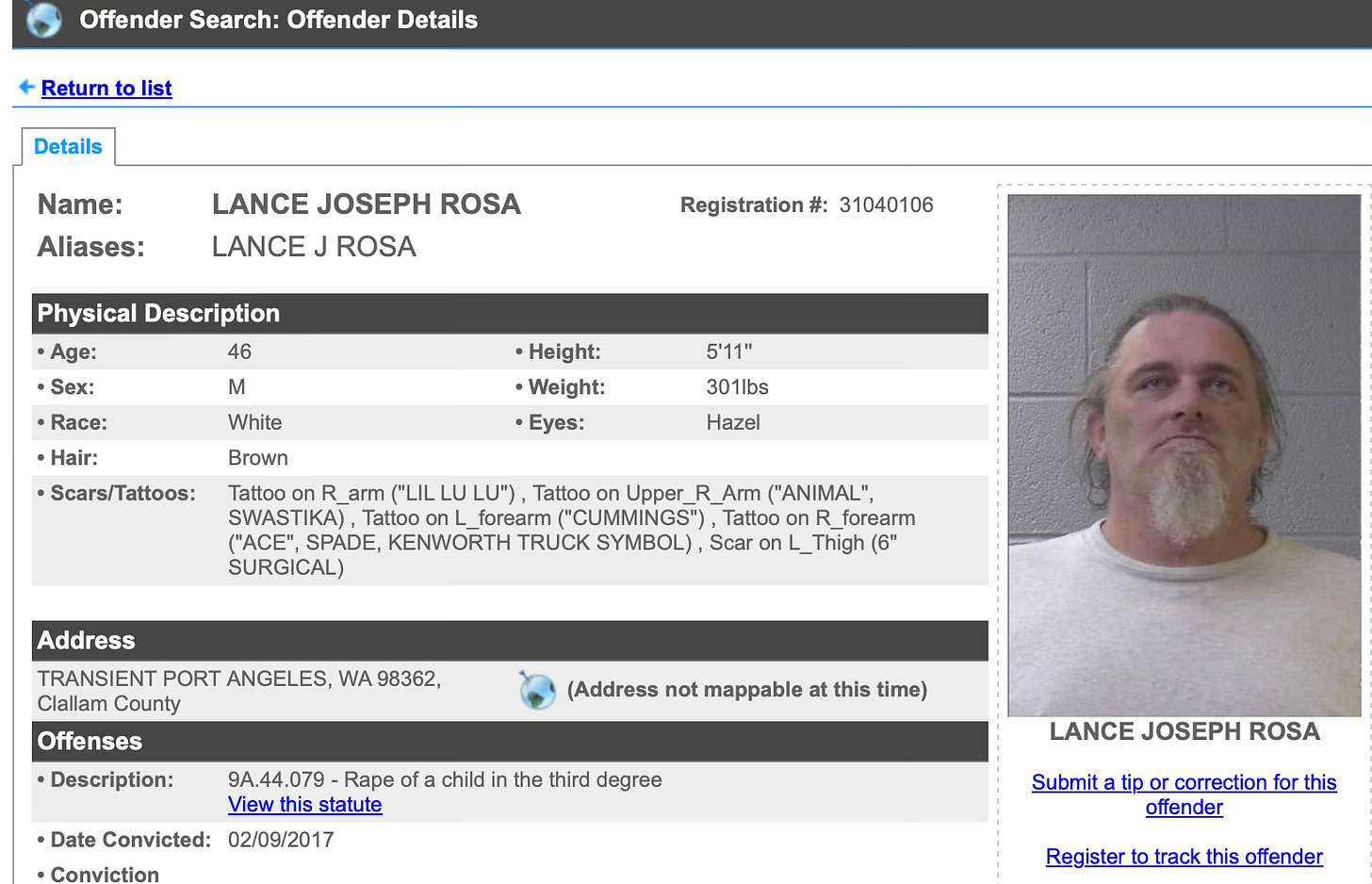Last summer, two 13-year-old girls were allegedly assaulted at Railroad Bridge Park. This week, their suspected attacker was arrested thanks to DNA evidence. But the bigger story isn’t just about one predator. It’s about how our own commissioners have turned Clallam County into a magnet for sex offenders, addicts, and violent repeat offenders. The irony? While citizens chant about pedophiles in power, our leaders are the ones creating the conditions that draw predators to our community.
A summer night turns dangerous
This Flashback Friday takes us back to Wednesday, June 19, 2024. The last day of school had just passed, and two 13-year-old friends decided to enjoy a summer evening at Railroad Bridge Park on the Dungeness River. It was just after 8 p.m., still light on one of the longest days of the year.
By 10:47 p.m., panic had set in. Deputies received a report of a missing 13-year-old girl. Her father told deputies that his daughter had gone to the park with her friend but hadn’t returned. He had searched the park himself with no luck.
Deputies and Sequim Police joined the search. They eventually located the girls — but not alone. They were hiding with a man who claimed there was a bear nearby. Officers briefly spoke with him, capturing the interaction on body-worn cameras, but he wasn’t identified and simply walked away.
The girls later told deputies that the man had approached them while they swam in the river. He introduced himself as “Danny,” said he was 19, and even gave them his dog’s name: Kevin. But once home, one girl confided to family that she had been sexually assaulted at the park. In subsequent interviews, both revealed they had been victimized. The suspect had even shared social media contact information with one of them.
You wouldn’t know any of this if you relied on the Sequim Gazette police blotter from that week. June 19 listed only two vehicle accidents. June 20 listed a missing report. The rest of the week? Nothing. No mention of children allegedly raped at one of Sequim’s most popular family parks.
Fast-forward: A name and an arrest
This week, after months of investigation and DNA testing, law enforcement identified the suspect: 26-year-old Daniel L. Sigmon of Port Angeles.

On Tuesday, Clallam County Superior Court issued a felony warrant. Hours later, deputies found Sigmon at a bus stop near Highway 101 and Sieberts Creek Road — directly in front of the Conestoga RV Park, where records show he had been staying. He was arrested without incident and booked into jail on charges of Rape of a Child (2nd degree), Child Molestation (2nd degree), and Assault (2nd degree).
Sigmon isn’t from here. Public records show past addresses in Tacoma. So the question is obvious: why would a 25-year-old alleged child rapist relocate to Clallam County?
Why here? The answer is in our policies
Two local policies help explain it:
Free Clallam Transit. Since January 2024, bus service has been free. The result? A steady influx of transients, many with criminal records. Riders and drivers alike report more fights, overdoses, and assaults. Some locals now refuse to ride altogether.
Harm Reduction on a Silver Platter. At the county-funded center in downtown Port Angeles, you don’t just get Narcan. You get syringes in multiple sizes, alcohol prep pads, fentanyl test kits, and pipes — straight, bubble, or hammer — all free. Staff will even offer a “boofing kit” if that’s your preference. There’s free pizza while you pick up supplies, along with body lotion, nail clippers, pregnancy tests, and Plan B.
Combine free buses, free paraphernalia, and free food, and you have an open invitation to addicts and predators from Tacoma, California, Missouri, and beyond.
The cost of “compassion”
The cost of this homeless-and-addiction industrial complex is staggering for one of Washington’s poorest counties. Taxpayers foot the bill for free transit, free supplies, endless emergency room visits, and — now — public defenders for predators like Sigmon.
Port Angeles has 27 registered sex offenders. Nine are listed as transient or failing to register. Among them:
Joseph Bell, a registered sex offender arrested earlier this month for theft.
Lance Rosa, a transient with a long record of rape and assault. Rosa’s story is chilling.
The Rosa case: A pattern repeats
Back in 2017, Rosa was convicted of Rape of a Child. But his crimes go back further.
In Bellingham in 2016, Rosa raped a woman in Maritime Heritage Park — a park long plagued by a homeless encampment. The woman bumped into him at dawn. He told her his name was “Chance.” After half an hour of small talk, he dragged her under the boardwalk, where another homeless man forced her into sex acts before Rosa raped her too.
The victim’s DNA exam showed scratches and bruises. Police released a sketch, swabbed Rosa’s DNA, and it came back as a match. Rosa fled to Port Angeles but was arrested and sent back to Bellingham.
In 2017, he pleaded guilty to rape, kidnapping, and assault. The judge sentenced him to more than nine years. Prosecutors said his crimes didn’t just harm one woman — they shook the entire community, making families feel unsafe in their parks.
Sound familiar? Sequim’s Railroad Bridge Park is today what Maritime Heritage Park was then: a community space where families now fear predators.
The ironic protest
And this brings us back to the courthouse. This week, as Sigmon’s name became public, protesters were once again waving signs outside Clallam County Courthouse, shouting about pedophiles and accusing national politicians of protecting them.
But the truth is uglier — and closer to home. Right behind those protesters, in the Board of Commissioners chambers, local leaders are making decisions that attract criminals like Sigmon, Rosa, and Bell to Clallam County.
The pedophiles we should fear aren’t on the East Coast. They’re here — riding our buses, sleeping in our shelters, lurking in our parks — because our leaders made it easy for them.
Rolling out the welcome mat
Clallam County has become a destination for predators, addicts, and repeat offenders. Not because of bad luck, but because of deliberate policy. Free buses. Free drugs and paraphernalia. Soft-on-crime justice. And a political culture that would rather score points against Washington, D.C. villains than protect our own children.
It’s not “compassion.” It’s a betrayal.
The real question for taxpayers is: how much longer are we willing to fund policies that invite danger into our own backyard?




















